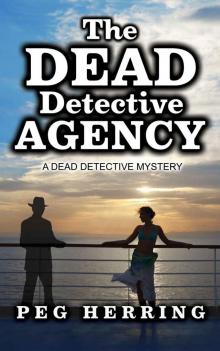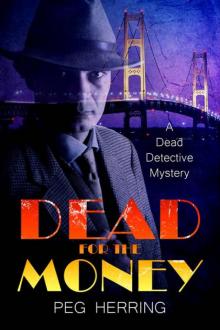- Home
- Peg Herring
Dead for the Money Page 2
Dead for the Money Read online
Page 2
Seamus focused on a point the old man had omitted. “Where is Bud’s mother?”
Dunbar gave a huff of disapproval. “One seldom knows where she is or which man she is with. Having a child cramped her style. When I demanded she either act like a mother or give me guardianship, she couldn’t wait to sign the papers.”
“I suppose there was money involved?”
Dunbar’s shrug acknowledged Seamus’ deductive power. “I don’t think Callie ever saw Buddy as her child, only as a means to my money.”
“What does the kid know about it?”
“He knows nothing, but I am sure he suspects a lot.”
“They don’t communicate?”
“No. Callie staying out of Bud’s life was part of the deal.”
“And he’s okay with that?”
Dunbar stepped back, leaning his forearms against the rail. “I think he trusts my judgment, although I’m sure he is curious about his mother.” He added as an afterthought, “I suppose a psychiatrist would say Bud suffered emotional scars from her abandonment.”
“No sign of wanting marriage and a family?”
“Not so far.”
“So Bud is a player?”
Dunbar frowned. “I wouldn’t use that term. An eligible bachelor is always welcome, and plenty of women want to be seen on his arm. Up till now, no girl has lasted long there.”
Seamus formed a mental image: Bud Dunbar, man-about-town. “Your grandson lived with you?”
“Until he completed his MBA. Now he manages Dunbar Enterprises in Chicago.”
Running one hand along his jaw line, Seamus asked, “Did you keep control of it?”
The old man’s feet shifted, grating slightly on the metal deck. “I have final say, but we always made important decisions together.”
So Buddy had almost all the power. “What happened that day up on the cliff?”
“As I said, I was a fan of yachting, even after I became too unsteady to stand on a deck. It became a tradition for Bud and me to climb up to the top of a bluff near my house and watch as the Chicago-to-Mackinac racers sailed north. The last few years I was unable to walk that far, so we took the golf cart. We’d spend hours up there, making predictions and critiquing the different crews as they passed.”
“Okay. Tell me what you remember, starting from when you left the house.”
Dunbar closed his eyes briefly. “The day was a particularly beautiful one, although July has been very hot. Bud had everything in the golf cart when I came down: binoculars, water, and a couple of those chairs that come in canvas sacks.”
“And where exactly is this bluff?”
“My property is” —he stopped himself— “was near Frankfort, Michigan. I own two hundred acres with some beachfront, some open meadow, and a lot of woods. On the north end of the property, a bluff overlooks Lake Michigan. The area around it is wooded, but a parting in the trees at a spot fifty feet above the lake provides a magnificent view. That’s where I—” His voice trembled, but he coughed once and went on. “When I bought the place, I had a fence installed to prevent anyone falling over the edge.”
“Smart move.” Obviously, the fence had not done its job.
“As I got less steady on my feet, the fence became more of a necessity, something sturdy to hold onto. My handyman always made sure that it was in good repair.”
“Okay. Back to that day.”
Dunbar’s gaze lost focus, but with visible effort, he continued his narrative. “I remember peaceful silence on the ride up there. A golf cart doesn’t make much noise, and Bud and I never felt like we had to converse if there was nothing to say. I was looking forward to the race. Small birds flew up and flitted away as we passed, startled by the movement. I felt small branches snap under the wheels. I could smell the pines, and a few cones had dropped into the sand along the track. I saw some prints left by animals, a couple of deer and a porcupine.”
Seamus found himself enjoying Dunbar’s description. Yes, that was life: all the senses actually working, not some re-created facsimile that paled in comparison. It was smelly and noisy and inconvenient, but feeling, really feeling, was like nothing else.
“By the time we got to the viewing point, the sun was well up. To be honest, it was uncomfortably hot, downright tropical for Michigan, but Bud had brought an umbrella that fit into the frame of my chair for shade.
“We stopped. I was using a cane, and I waited while Bud unloaded our things from the cart. He hung two pairs of binoculars around his neck, put the water into his backpack, hefted the chairs, and we set off. It isn’t far to the viewing point, probably thirty yards, but the trail is bumpy, and it took me a while to make it. I guessed from my grandson’s expression that he was wondering if it had been a good idea to bring me up there.” Dunbar smiled grimly. “Did you know that walking on an uneven surface is one of the most difficult things for the brain to handle?”
“No.”
“They can’t design a robot that can do it efficiently because so many tiny adjustments must be made.” He added with a hint of pride, “It took longer than it once did, but I made it on my own power.”
That’s what it’s like to get old, Seamus thought. Tiny victories over a rebellious body. Small achievements that help you believe it isn’t over. He recalled a friend of seventy who had insisted on demonstrating at every opportunity that he could still do push-ups. See? I’m not dead yet.
“Describe the area around this viewing point for me.”
“As I said, it overlooks the lake, an open area the size of a mid-sized room. It drops steeply into some trees and slopes down to a tiny strip of beach.” His lips pressed together briefly. “I don’t remember much about the fall, just the helpless feeling that I could not stop it.”
“We’re not there yet. Go back to when you and Bud arrived.”
Dunbar relaxed his shoulders with a roll and a deep breath. “Bud set up the chairs, but I wasn’t ready to sit down yet. He handed me my binoculars. We didn’t see anything coming, but you can’t predict when the first boat will show up. So much depends on weather and conditions on the lake. After a while Bud said, ‘Gramps, do you hear that?’ I heard nothing.”
“What did he hear?”
“He thought it sounded like an animal in trouble in the woods to our right.”
“What kind of animal?”
“I don’t know. But Bud heard it again, and a few moments later, a third time. He said something was hurt, and he was going to go and see what it was.”
“You never heard the noise.”
“No.”
“So what did he do?”
“Well, he set his binoculars down on the chair seat and took off into the woods. I watched him disappear, then nothing. After a while, I turned back to the lake, looking for the first boats.”
Dunbar stopped, and Seamus knew they had come again to the fall. “Okay,” he told the old man, “Slowly, tell me everything you recall.”
He shrugged helplessly. “I was relaxed, focused on the water. Suddenly I was falling. I felt the resistance of the wooden fence rail against my stomach. My legs left the ground. I grabbed for the rail, but I was too late. I was over the fence before I could even call for help. My shoulder hit the ground on the other side.” His jaw jutted, lips tight, but he continued. “My reflexes were too slow, my body too stiff, my mind too overcome. At forty, even at sixty, I might have saved myself, but—” Disgust tinged his voice. “It’s like they say. Old age isn’t for sissies.” He turned once more to face Seamus. “One thing I am sure of, though. I did not fall over that fence. I was pushed.”
Chapter Two
BRODIE DUNBAR made her way up the trail, slowing once she was out of sight of the house. Scarlet would soon discover that she was not in her room, but Scarlet would understand that she needed to be alone.
The trees smelled good, all piney and fresh, but Brodie willed herself not to notice. It had to be wrong to notice beauty in the world when Gramps was gone from it. A warm
breeze touched her cheek as she finally stepped into the open space of the viewing point, but she tried to ignore that too. Nothing should matter now that Gramps was dead.
Before her, Lake Michigan sparkled in the July sunshine. The view could have been a postcard, except no camera could adequately capture the scene. She was high above the lake, and the drop beyond the fence was dizzying. Heights did not scare Brodie. In fact, she usually enjoyed the feeling of standing in lofty places. But this was where Gramps had fallen to his death. It was different now.
She willed herself to approach the rail fence that stood before her. Unable to look down at where Gramps must have landed, she kept her eyes on the rails themselves, searching for weakness. They looked as strong as ever. She knelt and took one in her hands, feeling the rough wood. She pulled on it hard. It gave slightly, as wood is supposed to, but it was whole, doing the job it was built for, keeping people from falling over the bluff edge.
So how had the fence failed Gramps? They said he must have had a dizzy spell, but if he got dizzy, he could have held on, couldn’t he? Why hadn’t he? Was it her fault for not telling what she knew? She’d wanted to protect him, but she might instead have contributed to his death.
Brodie wished she could talk to Bud about what happened, since he’d been right there. But Bud was busy with police and family and business stuff. He had no interest in Brodie, who was nobody.
She tried to think of someone who would care, really care, if she never returned from this place. She peered over the edge at the drop she had found exhilarating until now. Nothing below indicated the tragedy that had occurred. It seemed to her that the earth and water should give some sign that a wonderful old man had died in this place. But it was a beautiful as ever, as peaceful as before. The lake moved below her, waves chasing each other to see who would travel farthest ashore. The sun had risen high enough to reach the spot, but barely, so the light was still filtered through the treetops behind her. Everything was the same, except that Brodie had no future, here or anyplace else that she could imagine, without Gramps.
William C. Dunbar—Gramps—had been everything to Brodie, so much so that she considered crawling over the fence herself and flying—or falling—to wherever he was. Everyone except Gramps thought she was ugly, stupid, and not quite right in the head. Maybe it was okay if she left the world. Maybe there was something better in the next one.
She looked again at the expanse of water on the other side of the fence. It sparkled invitingly. Every once in a while a wave slapped against the sand with a happy little sound. Without conscious decision, she climbed onto the fence and over it, hanging onto the top rail and extending her arms so that she looked straight down. Had Gramps known he was going to die? Had he thought of her as he fell? The trees below seemed wicked now though she had always loved staring down at the contrast between their green branches and the soft sand beyond them. She hoped Gramps had lost consciousness and that he had never known that his life would end that day, that hour, that second. It was all a kid could hope when the one person who wasn’t paid to like her was gone.
SEAMUS LEFT THE SUBJECT of Dunbar’s death for a while, giving the man a chance to regain control of his emotions. “Tell me more about the property.”
Dunbar pulled himself back once more from thoughts that obviously plagued him. The safer subject, his home, allowed him to relax somewhat. “I bought the land back in the ’60s, when it was relatively cheap,” he said. “The original buildings sat along a small lagoon, protected from the winds off the lake. That house burned long ago, and the site is almost completely overtaken by woods. I chose to build in a more open space down the beach. Lila would have loved it, had she lived.” His shoulders twitched, and Seamus wondered if he was reminded that he, too, was now dead.
“When Buddy became my responsibility, I decided to move to Michigan in order to give him the kind of childhood a kid deserves: room to wander and a small, supportive community.”
“Sounds nice,” Seamus lied. He couldn’t imagine living away from a city center where there was always something to do. “Anyone else live with you?”
“Everybody, it seems some days.” Dunbar looked a bit sheepish. “When you’ve got a house with twelve bedrooms, family tends to congregate.”
“Who’s everybody?”
“My sister Arlis, for one.”
“What does she do?”
“Her hair, mostly.” Dunbar sniffed. “Arlis married one of my managers. When her husband died, she let her only child, Leland, handle her money and he lost it all. Some hare-brained scheme that was not quite legal and not well planned. When everything fell apart, Leland left the country to avoid legal ramifications. Arlis came to live with me.”
“So this Leland is not around?”
“Haven’t seen him in years, but he does call his mother regularly.” His lips tightened. “None of it was his fault, Arlis says.”
Red flags went up in Seamus’ mind. “Leland is dishonest.”
“He might only have been young and stupid. Apparently, he has spent the last decade trying to atone. In fact, he became a sadhu.”
“What?”
“It’s Hindu.” Dunbar rolled his eyes. “I had to look it up. Rejecting everything life requires of most of us, a sadhu has no home or possessions. They work when someone asks them to and eat when someone feeds them. According to his mother, Leland travels the world, helping out in disasters and out-of-the-way places.” He raised both hands, palms up. “Believe me, I’ve heard more about it than I ever cared to. Arlis wants us to understand that Leland is a changed man.”
“So he can inherit some of your money, maybe?”
Dunbar shrugged. “Arlis claims he has moved past wanting any earthly reward.”
Seamus pictured a barefoot hermit with offensive body odor and a beard thick enough for robins to nest in. “Okay, so you support your sister. Who else lived with you?”
Dunbar’s eyes softened. “There’s Brodie.”
“Another relative?”
The answer was oblique. “I didn’t know she existed until she was three years old. She was—not being treated well. When I stepped in to help, her mother agreed to let me adopt her.”
“More money changed hands, I assume?”
Dunbar grimaced. “What’s money for if not to help those who need it?”
Seamus could think of worse things a man could do with his money than rescue kids whose parents were screw-ups. “So what does Brodie do?”
“She’s still a kid, just thirteen.” His smile was rueful. “Her apparent purpose in life is frustrating anyone who tries to control her.”
“A challenge, huh?”
“To put it mildly.” He covered a smile with his fist. “She is the reason for another resident in my home, Scarlet.”
“Another relative?”
“No. Scarlet McMorran is Brodie’s tutor. She has been with us for almost a year now, and she has done wonders.” He paused, backing up slightly. “Brodie was almost feral when I adopted her. Over time she became civilized, but not completely socialized.” Dunbar did not try to hide his smile this time. “She has a reputation for punishing people she does not approve of. Her pranks are quite innovative, and they’re aimed at people who deserve them, at least to Brodie’s way of thinking.”
A brat, Seamus concluded privately.
“Scarlet has had some success, I think because she truly cares for Brodie. At the same time, Scarlet is wise enough to pair caring with expectations of proper behavior.”
“Okay. Your sister, the kid, and her warden. Who else?”
“My personal assistant Arnold Wilk is there most of the time, although he gets weekends off and often goes away with friends. Our cook-and-handyman couple, Shelley and Orville Briggs. Those are the permanent members of the household. Bud visits when he can, but work keeps him in Chicago most of the time. My lawyer, Collin Marks, comes quite often and stays with us sometimes. Both Arnold and Collin were at the house that...um, last day. Col
lin rode up with Bud from Chicago for some R&R.”
Seamus tried to picture a map of Michigan. “Isn’t that kind of a long drive?”
“It is, but Bud likes it. M-22 from Manistee to Frankfort is scenic, with lots of twists that Bud claims are relaxing after negotiating the turns of the world economy all week.”
“I guess. Anyone else?”
“We often have guests, as anyone who owns a home on a lake will tell you. But this weekend it was only the people I named.”
“Do all of them figure in your will?”
“Well, yes. Arnold, the Briggses, and Collin get small bequests, Brodie inherits a substantial amount at eighteen, and Arlis gets support and a home until her death or remarriage. Bud has control of it all.”
“Is that everyone mentioned in the will?”
“There are charitable donations, of course. Oh, and the family home in Ontario goes to Leland.” Dunbar sniffed. “Since he can’t return to the States, it was the best I could do for him.”
“You have land in Canada?”
Dunbar nodded. “My father, the last of the family except for Arlis and me, died a few months after my wife was killed. He was a simple man, rather dour and uninterested in modern conveniences. Having too much to deal with at the time, I simply paid someone to close up the house. I never went back. When Arlis suggested it should be her son’s inheritance, I agreed. Leland can sell the place and give the money to his charities or spend it. I don’t care.”
Someone called out behind them, and both men turned. A woman stopped near them as a second woman approached with the daily schedule in hand. The two began an animated discussion of which events they would choose to participate in, apparently unaware that they were interrupting the two men’s conversation.
“There’s choral practice at seven,” one of them said. “I’ve always wanted to sing in a choir.”

 Macbeth's Niece
Macbeth's Niece KIDNAP.org
KIDNAP.org The Dead Detective Agency (The Dead Detective Mysteries)
The Dead Detective Agency (The Dead Detective Mysteries) Dead for the Money
Dead for the Money